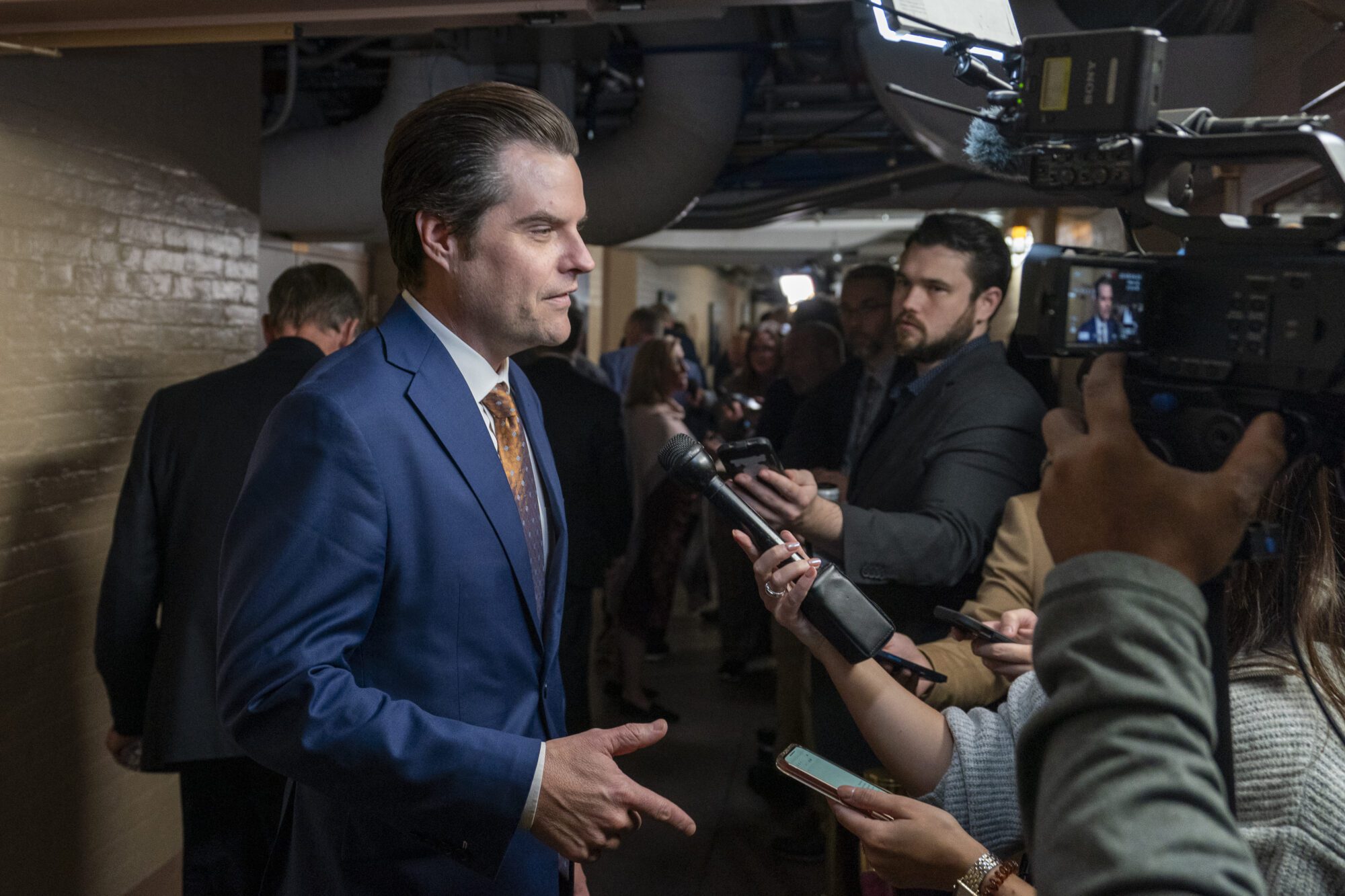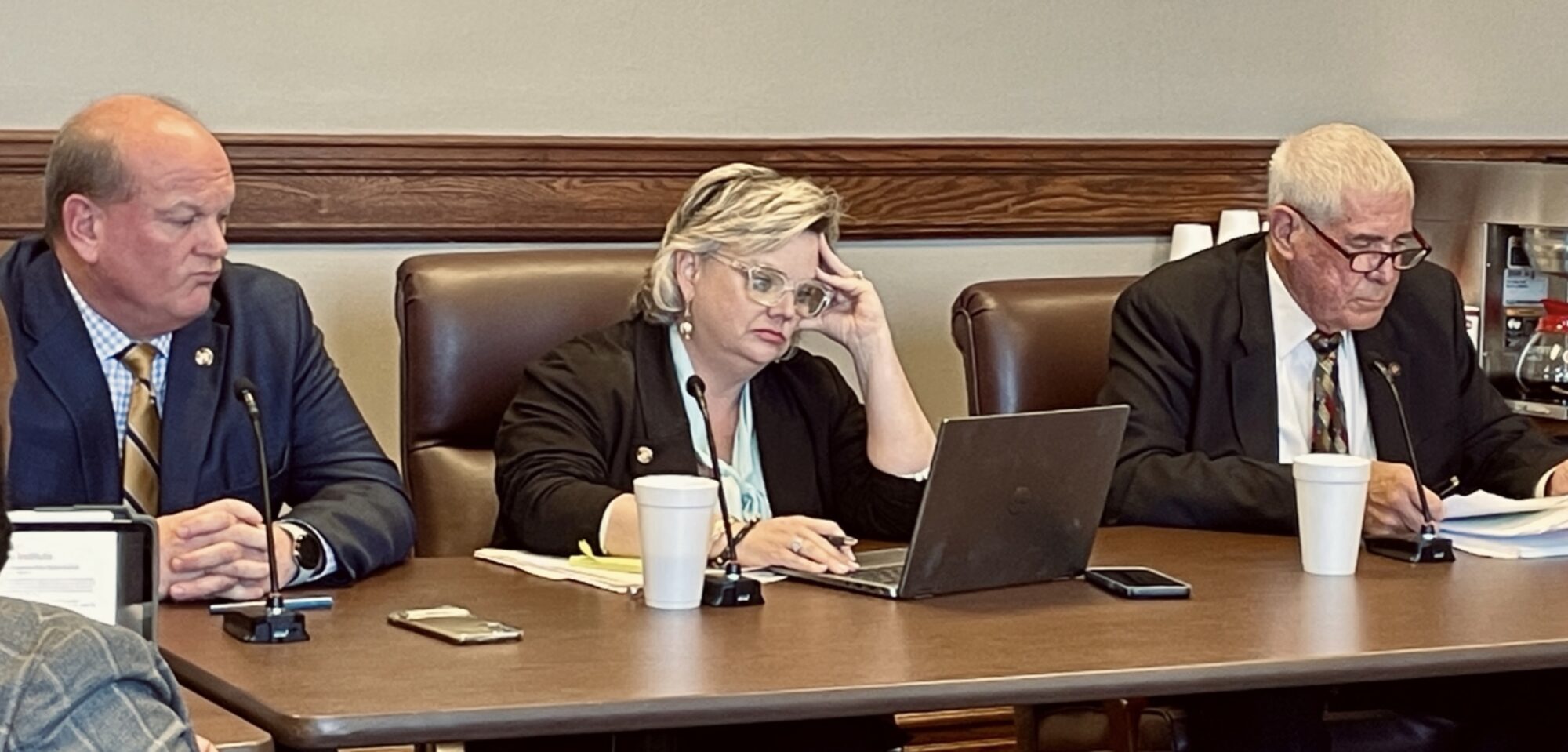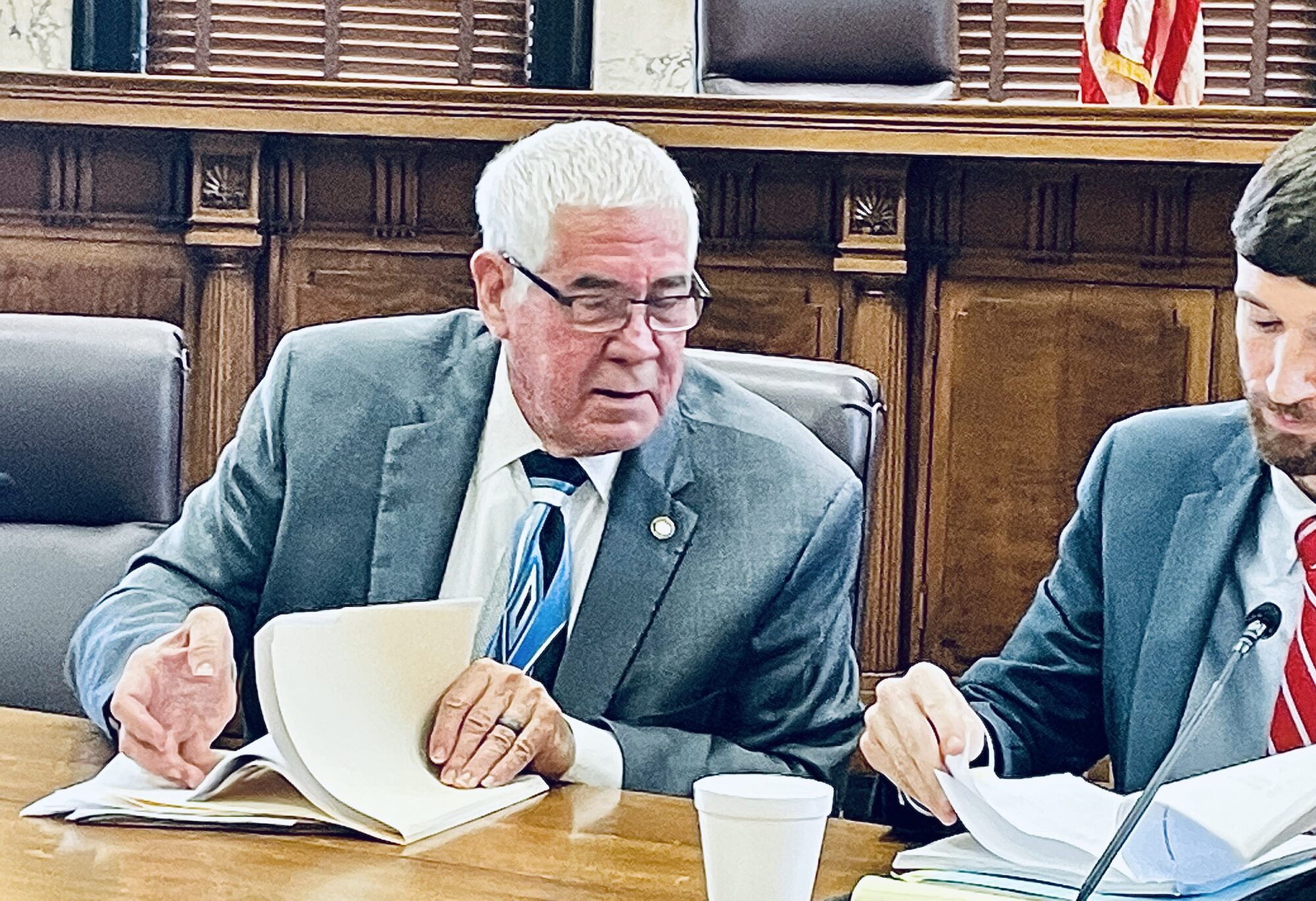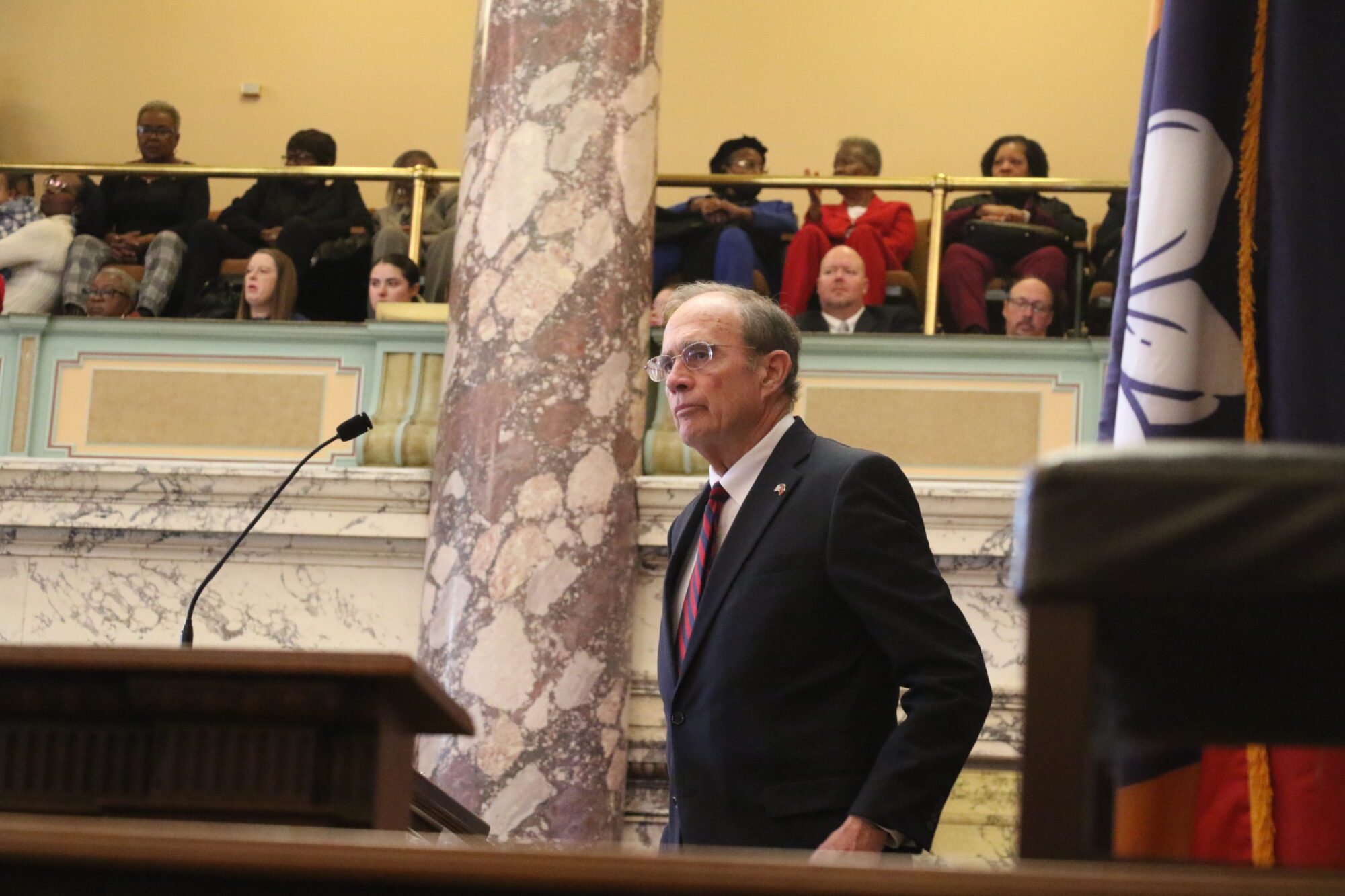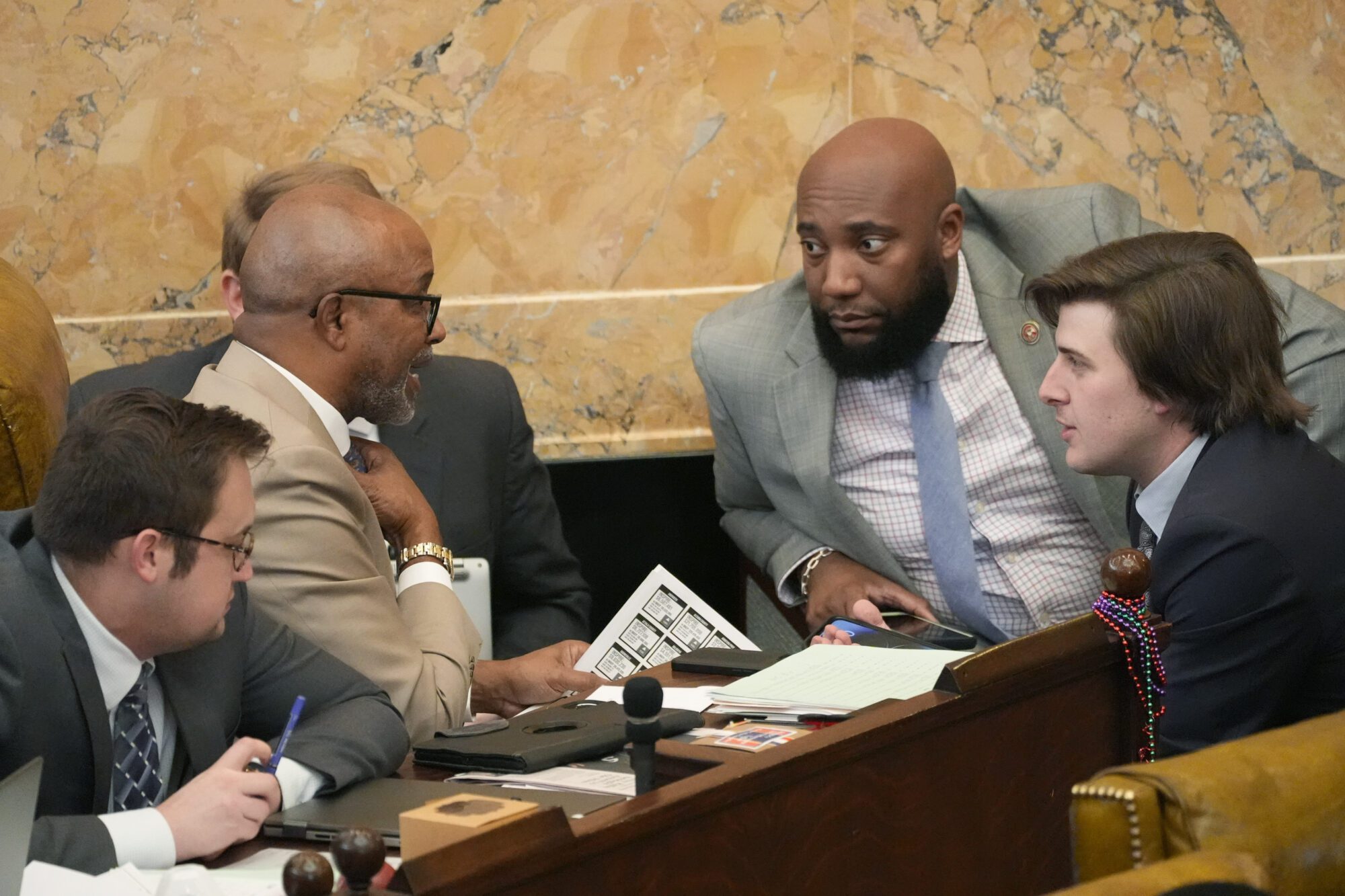
Mississippi state Rep. Robert Johnson, D-Natchez, second from left, confers with House Education Committee Vice Chairman Kent McCarty, R-Hattiesburg, right, and state Reps. Daryl Porter, D-Summit, second from right, and Jansen Owen, R-Poplarville, left, about his concerns of the Wednesday passage of a funding alternative to the Mississippi Adequate Education Program (MAEP) called the Inspire Act, which proponents say is a simpler funding formula and more equitable to the public school districts, Thursday, March 7, 2024, in the House chamber at the Mississippi Capitol in Jackson, Miss. (AP Photo/Rogelio V. Solis)
- The INSPIRE Act is arguably more progressive than Mississippi’s current education funding formula. Still, it curiously continues to draw opposition from progressive devotees to MAEP.
The Mississippi House of Representatives proposed a new education funding formula this year called The INSPIRE Act (INSPIRE). The Senate has killed the legislation twice already, citing a desire to study the proposal out of session. House leaders, however, continue finding new legislative vehicles to revive the proposal as session’s end draws nigh.
On its face, INSPIRE yields higher levels of education spending than the current funding formula, the Mississippi Adequate Education Program (MAEP). If enacted, it would increase spending by an estimated 250 million dollars this year alone (some cost estimates put this figure even higher). In subsequent years, an inflation factor would further raise the amount dedicated to education.
Not only would the state’s total education spending increase under INSPIRE, but spending would be more generous for specific categories of students that proponents contend are more expensive to educate. The proposal creates new ‘weights’ or bonuses to the base student cost not presently found in MAEP.
Comparing Weights
MAEP currently provides a single weight of 5 percent for low income students based on receipt of free and reduced lunches. Under INSPIRE, a low income student would receive a 30 percent “bonus” on top of the base student cost. Additionally, INSPIRE provides a 10 percent weight for districts with “concentrated poverty.” But INSPIRE does not stop at low income students. It creates a series of additional new weights detailed below:
| INSPIRE Student Categories | INSPIRE Base Student Cost | Funding with New Weight |
|---|---|---|
| Low Income (30%) | $6,650 | $8,645 |
| English Language Learner (20%) | $6,650 | $7,980 |
| Tier 1 Special Needs (60%) | $6,650 | $10,640 |
| Tier 2 Special Needs (125%) | $6,650 | $14,963 |
| Tier 3 Special Needs (175%) | $6,650 | $18,288 |
| Career Technical Education (10%) | $6,650 | $7,315 |
| Sparse Population (0-8%) | $6,650 | $6,650-$7,182 |
INSPIRE would also send to each district a 5 percent gifted education bonus for a flat 5 percent of its students. See the projections of how INSPIRE would impact your school district here.
Notably, the figures above do not include substantial federal funding, or certain local funding, that flows outside of the state formula.
Opposition to Reform
There is a universe in which INSPIRE might have drawn concern from within certain conservative circles. The legislation is not cheap, increasing spending at a sizable clip even as student enrollment in Mississippi continues to decline. In time, it will require more affluent districts — districts that already pay much of the state’s tax revenue — to put up additional local money. Both the number and size of weights are more progressive than what is currently in law.
But opposition has not come from conservatives. They have largely rallied to the plan on the promise it will fund students as individuals with different needs, and in recognition of MAEP’s ongoing design failures.
Instead, a familiar cast of progressive advocates and pundits oppose INSPIRE. Nancy Loome is the head of “The Parents’ Campaign.” Her organization maintains a near religious commitment to MAEP, and more generally, to opposing any effort to give parents more power over their children’s education.

Loome cites MAEP’s “objective formula,” that sets the base student cost, as the reason for her continued allegiance. Only there is nothing magical about MAEP. It was not handed down to Moses on tablets. Mere mortals devised the formula in a government office building in 1997. And almost from the point of enactment, MAEP’s “objective formula” proved unworkable. It’s only been “fully funded” twice in twenty-four years.
The Legislature already sets the base student cost on its own each year, not the formula.
Given that fact, the only conceivable value remaining for MAEP activists is that it provides a political tool to bash legislators about the head when they fail to “fully fund” the formula. That seems to be a poor prize in comparison to actually drawing down more resources. What’s more, those activists should look around. The same legislators they bash for “underfunding” the formula keep getting re-elected. If MAEP is a cudgel, it’s made of foam.
Some progressives seemingly get it. INSPIRE owes much of its bones to work done by New Jersey consultants at EdBuild in 2017. Mississippi First, a center-left education organization, has done yeomen’s work explaining the potential benefits of the legislation this session. Typically left-leaning editorial boards have expressed a preference for the law. And a majority of House Democrats voted for INSPIRE in the latest attempt to keep it alive.
Still, for Loome and others like her, it is hard to back away from a drum they’ve been pounding for years. I am reminded of Ralph Waldo Emerson’s admonition, though. “Foolish consistency is the hobgoblin of little minds.” Whether through INSPIRE, or some other vehicle, it is time to change the way we fund students in Mississippi.
